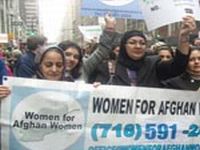Women's Rights: A Universal issue
Manizha Naderi, Executive Director of Women for Afghan Women, speaks about women's rights in Afghanistan, the effects of the Millennium Development Goals and the tremendous challenge which is keeping the world committed to Afghanistan in the years ahead, before going on to explain what the average citizen outside Afghanistan can do to help.

PRAVDA.Ru interviewed Ms. Naderi on Saturday December 7, 2013. The interview was conducted by Timothy Bancroft-Hinchey
Manizha Naderi was born in Kabul and raised in New York. She is the Executive Director of Women for Afghan Women (WAW), an NGO that works on the rights of Afghan women in Kabul and New York. She helped launch the Queens Community Outreach Programme in New York and moved to Kabul to launch WAW, helping the organization open nine Family Guidance Centres, eight women's shelters, four halfway houses and four Children's Support Centres in addition to spearheading a women's rights awareness-raising training programme that has reached over 125,000 Afghans.
1. What advantages have the MDGs brought women in Afghanistan?
By consolidating the most serious problems facing the people on this planet, they provide a focus, problems for stakeholders, especially international donor agencies, to concentrate on. Although all the MDGs are equally important, in terms of WAW's particular work, the most important are these:
The achievement of universal primary education
Promoting gender equality and empowering women
2. What are the main challenges for the future?
The main challenge is keeping the developed world committed to Afghanistan, especially to the women and children, so that the progress that has been made in the country, especially in women's attainment of human rights, isn't wiped out by conservative forces. The progress is real and significant, especially in terms of the obstacles that have to be overcome. It proves that the Afghan people are behind that progress, for it could not have occurred without their support. But that progress is anathema to forces in the country who depend on the subjugation of women to achieve domination of Afghanistan.
3. What is being done to address these challenges?
WAW is currently beginning a project to keep international interest in Afghanistan alive. We are at the beginning, but we will keep media informed of our progress as we move along.
4. To what extent do cultural and traditional practices hinder these initiatives?
Traditional harmful practices have to be overcome if women's rights are to take hold in the country, and they must take hold if Afghanistan's tenuous grip on democracy is to become solid. We have found that the people, the majority of whom are illiterate, believe what powerful men tell them about women's roles in society. Most of this is contrary to Islam. When we show them what the Koran actually says, they are astonished (and often grateful).
5. What can the average citizen outside Afghanistan do to help?
Yes, important question. They can keep their eyes on Afghanistan. Make a personal commitment to the women and children of the country. That commitment may eventually entail putting pressure on their governments to oppose backsliding (and worse) on women's rights. They should keep tuned in to WAW: www.womenforafghanwomen.org for information about how they can help. As things progress toward the withdrawal, we will post announcements on our website as to what each person can do.
6. Can we take a comparative look at women's rights and opportunities in Afghanistan and New York?
People in the U.S. condemn Afghanistan for the problems, the abuse, women face there, and the situation of the majority of women is definitely terrible. But they speak as if women in their country (the USA) gained their rights in a matter of months instead of decades, as if all the gender inequities in this country have been wiped away, and as if domestic violence, for example, doesn't exist here. But actually, in what country of the world are 3 women murdered every day through domestic violence? Answer: In the USA!
Manizha Naderi was born in Kabul and raised in New York. She is the Executive Director of Women for Afghan Women (WAW), an NGO that works on the rights of Afghan women in Kabul and New York. She helped launch the Queens Community Outreach Programme in New York and moved to Kabul to launch WAW, helping the organization open nine Family Guidance Centres, eight women's shelters, four halfway houses and four Children's Support Centres in addition to spearheading a women's rights awareness-raising training programme that has reached over 125,000 Afghans.
Interview facilitated by UN Women
Timothy Bancroft-Hinchey
Pravda.Ru
Subscribe to Pravda.Ru Telegram channel, Facebook, RSS!


